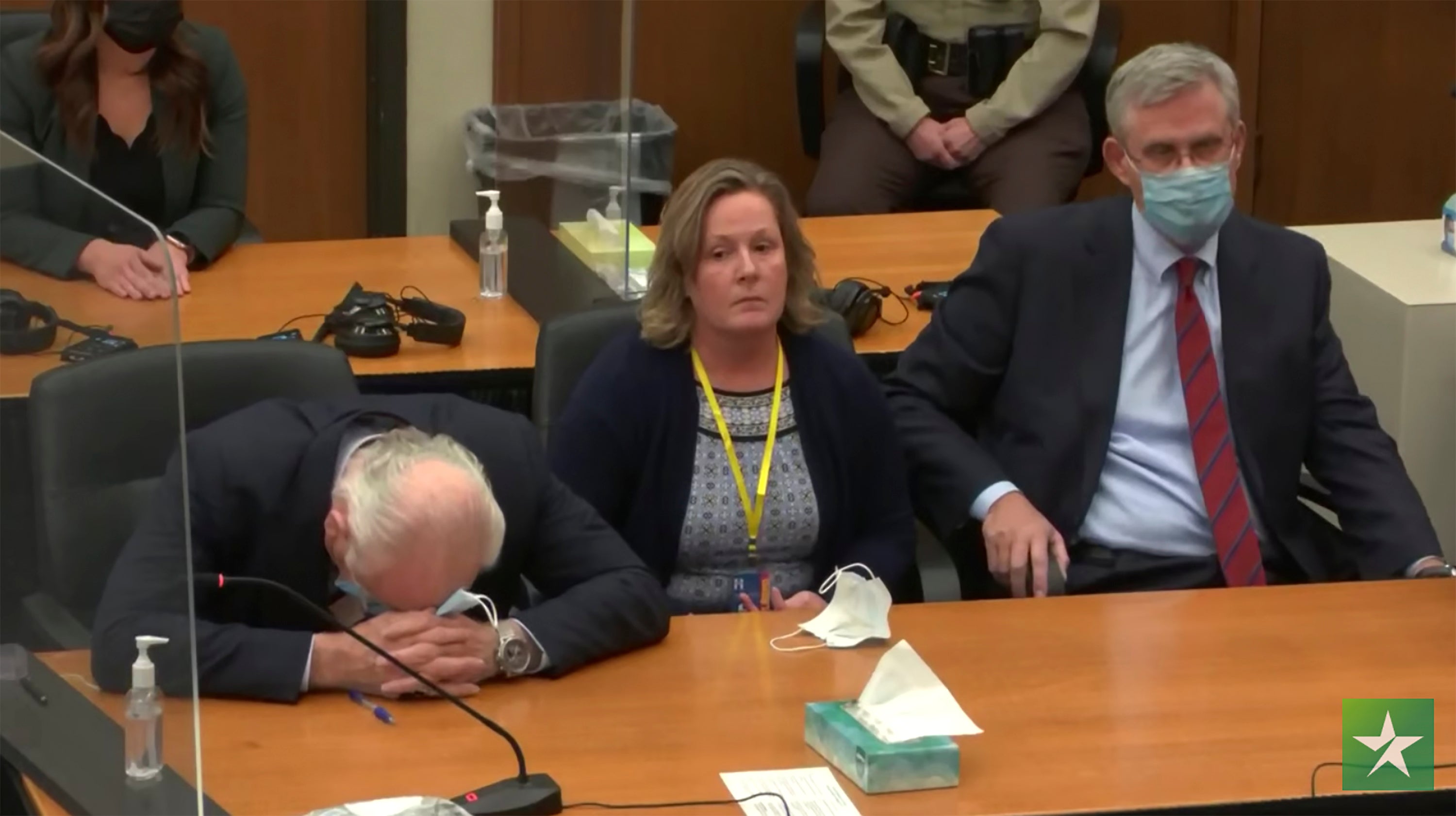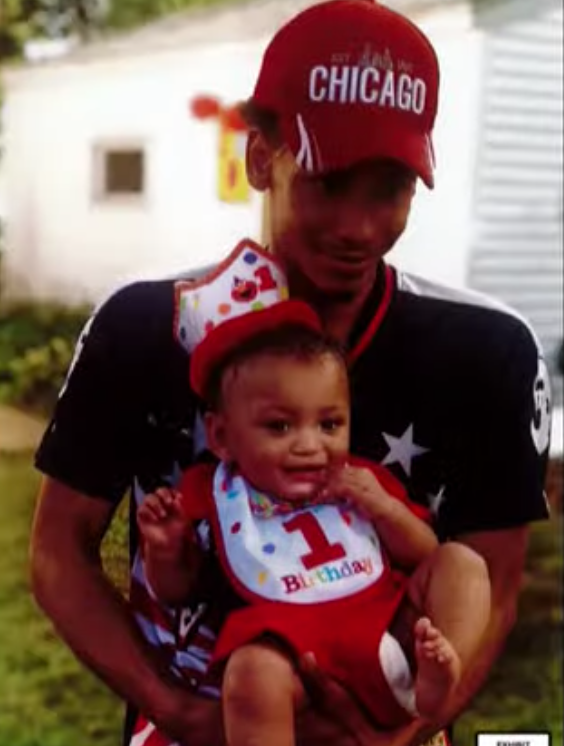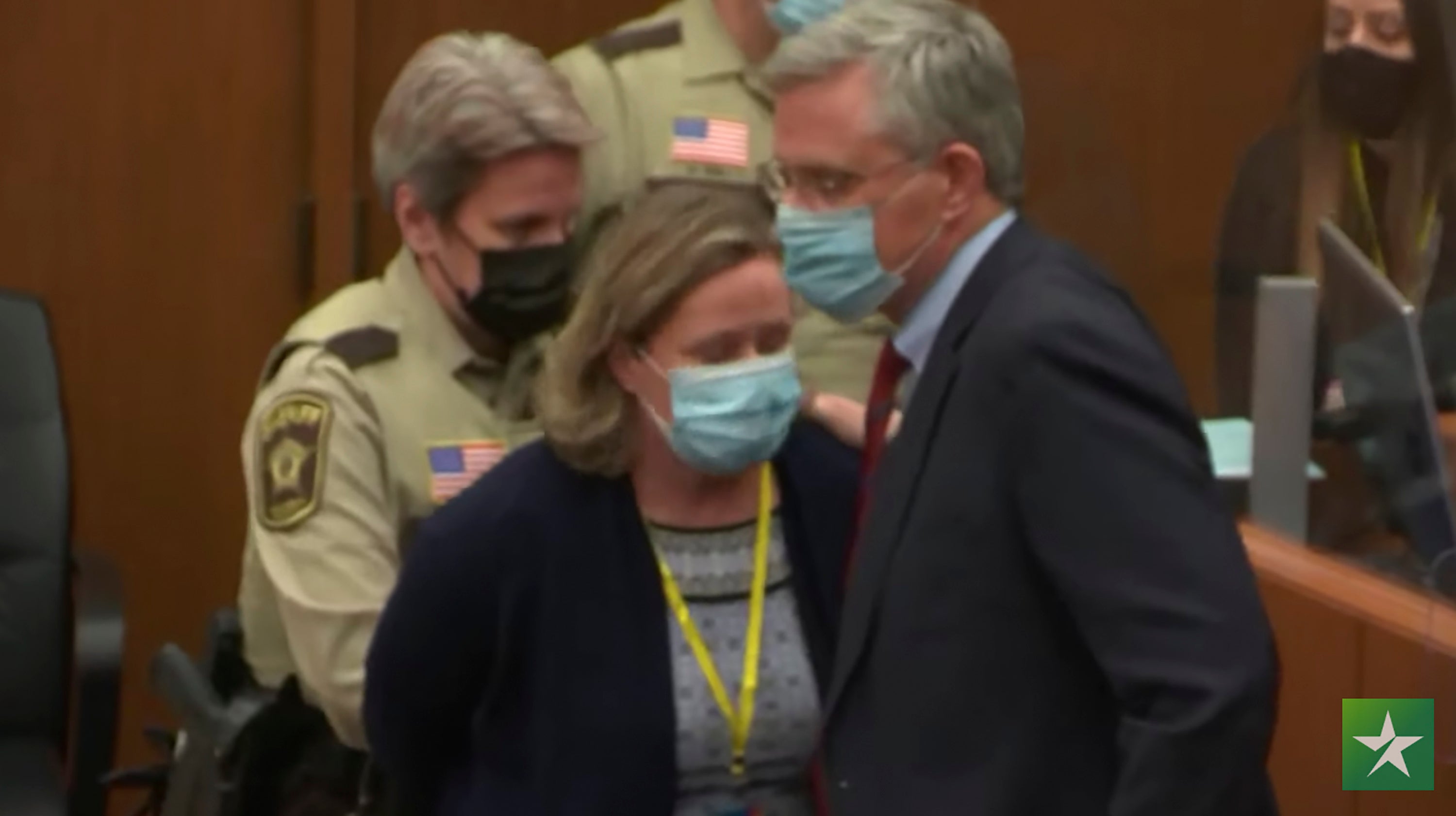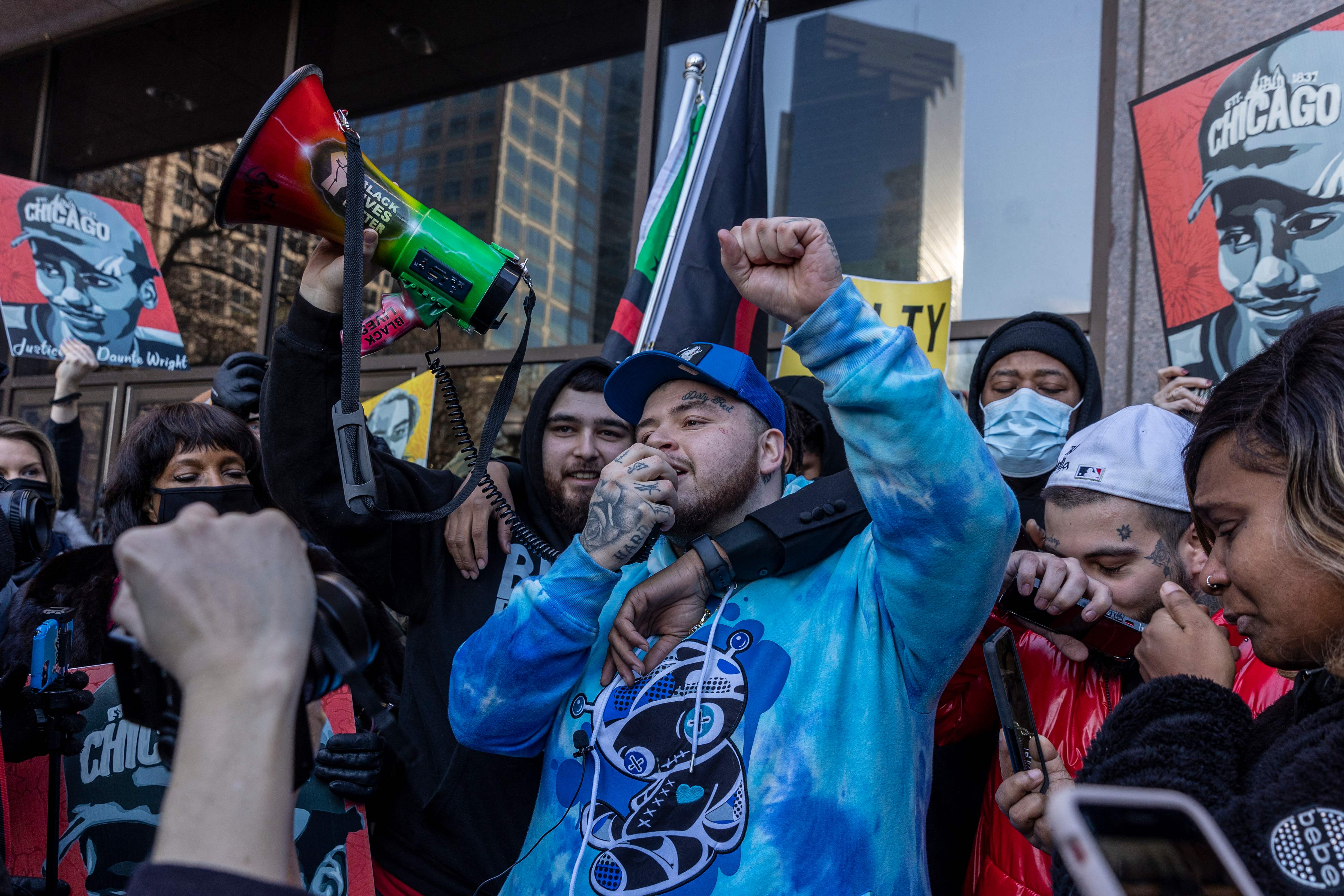Kim Potter verdict: Ex-officer found guilty on both manslaughter charges over shooting of Daunte Wright
The Brooklyn Center police officer was found guilty of first-degree and second-degree manslaughter over the death of the 20-year-old Black man
Kim Potter has been found guilty of both manslaughter charges over the shooting of Daunte Wright.
The Brooklyn Center police officer of 26 years was convicted on Thursday of first-degree manslaughter and second-degree manslaughter in Hennepin County Courthouse after she shot and killed Wright, 20, a Black man, during a traffic stop in Minnesota on 11 April.
She faces up to 25 years in prison and will be sentenced by the judge on 18 February.
A huge crowd outside the courtroom erupted in cheers as the verdict was read out, with Wright’s brother Damik telling supporters “we’ve waited a long time” and “we’re happy with the verdict”.
The almost all-white jury reached the verdict after more than 27 hours of deliberations and on the last day before they would be released for the holidays.
Potter, a veteran police officer, shot Wright during a traffic stop in Brooklyn Center after pulling him over for expired licence plate tags and an air freshener hanging in his rear-view window.
She said she mistook her firearm for her Taser when she fired one fatal shot at the Black man.
Bodycam footage of the incident played in court shows her shouting “Taser! Taser! Taser!” before opening fire.
She was charged with first and second-degree manslaughter and had pleaded not guilty to both charges.
Potter showed little reaction as the verdict was read out to the court, lowering her head briefly but showing none of the emotion that was evident on the witness stand when she broke down in tears, saying she was “sorry” for Wright’s death.
As Judge Regina Chu read out the verdict, Potter was flanked by her two attorneys, who stood beside her with a hand each on her shoulders.
When she sat back down, she was seen clutching a chain in her hands while one of her attorneys Earl Gray put his head on the desk.
Potter’s defence requested that she be released on $100,000 (£75,500) bail until her sentencing, arguing that it is the holiday period and she is a Christian, that she is not a flight risk and that she poses no danger to society.
The judge denied the request saying: “I cannot treat this case any differently than any other case.”
The former police officer was led away in handcuffs minutes later.

The more serious charge of first-degree manslaughter required the prosecution to prove that Potter caused the death of Wright while committing the misdemeanour crime of reckless handling of a firearm.
It carries a maximum sentence of 15 years in prison and/or a $30,000 (£22,300) fine.
The second-degree manslaughter charge required the prosecution to prove that she caused Wright’s death through culpable negligence, meaning she created an unreasonable risk and consciously took a chance of causing death or great bodily harm when she used her firearm.
This charge carries a maximum sentence of 10 years and/or a $20,000 (£14,900) fine.
However, under Minnesota law, people with no prior criminal record – like Potter – typically receive far lower than the maximum sentences. Sentencing guidelines recommend between 6 and 8.5 years in prison for first-degree manslaughter and between 3.5 to nearly 5 years for second-degree manslaughter.
Prosecutors intend to seek a more severe sentence than the recommended, however, arguing that there were aggravating factors in the case.

Wright’s parents gave a short press conference with Minnesota attorney general Keith Ellison outside the courthouse, where they welcomed the verdict.
Katie Bryant, the 20-year-old’s mother, said she “let out a yelp” when she heard the guilty verdict.
“The moment that we heard guilty on manslaughter one, emotions – every single emotion that you could ever imagine running through your body at that moment,” she said. “I let out a yelp.”
When asked what she felt when Potter took the stand last Friday, she said: “I’d rather not answer that question.”
AG Ellison described the outcome as a “degree of accountability for Daunte’s death” but said that “accountability is not justice”.
“Justice would be restoring Daunte to life and making the Wright family whole again,” he said outside the courtroom.
“Justice is beyond the reach that we have in this life for Daunte but accountability is an important step, a critical, necessary step on the road to justice for us all.”
The prosecutor added that he did believe Potter is “remorseful” and wishes “the best for her and her family” but said “she will be able to communicate” with her family while Wright’s family won’t get him back.
During closing arguments, prosecutors told the jury that being a police officer does not mean having “a licence to kill” and that Wright’s death was the result of a “colossal screw-up” by the veteran officer.
The case is about the “reckless handling of her firearm” and “culpable negligence” by the defendant, said prosecutor Erin Eldridge, arguing that she put “four people directly in harm’s way” when she opened fire on the 20-year-old.
She added that something being “an accident” does not mean it isn’t a crime, with intent to kill Wright not part of the charges.
In the defence’s closing arguments, Mr Gray argued that Wright “caused the whole incident” by failing to comply with the officers when they pulled him over.
He argued that Potter also had the right to use deadly force because she believed her fellow officer was in danger.

Potter took the stand at her trial as the final witness called for the defence. She gave emotional testimony, breaking down multiple times and apologising for Wright’s death.
“I’m sorry it happened. I’m sorry,” she sobbed. “I didn’t want to hurt anybody!”
The guilty verdicts came after a tense four days of deliberations with questions mounting over whether there would be a hung jury and a mistrial would be declared in the case.
Jurors – consisting of nine white people, one Black woman and two Asian women – deliberated across four days and more than 27 hours. By comparison, jurors deliberated for 10 hours back in April before finding another white Minnesota police officer, Derek Chauvin, guilty of the murder of Black man George Floyd.
On Tuesday afternoon, the jury showed signs that the 12 were struggling to reach a verdict when they sent a question to the judge asking what they should do if they couldn’t reach an unanimous verdict.
“If the jury cannot reach consensus, what is the guidance around how long and what steps should be taken?” jurors wrote in one of two notes sent to the court that day.

Judge Chu responded by rereading the jury instructions that they should continue to “discuss the case with one another and deliberate with a view toward reaching agreement if you can do so without violating your individual judgment”. Jurors were then sent back to deliberate further.
Under Minnesota law, a jury must reach an unanimous verdict of either guilty or not guilty on each charge in a criminal case. In the event of a hung jury, the judge declares a mistrial.
The other note asked for the zip ties securing Potter’s firearm to an evidence box to be removed so that they could handle it.
The judge granted the request and assured the court that the gun is fully secured and not loaded.
During deliberations, jurors sent only one other note to the court – a question on Monday afternoon asking for the date of Potter’s interview with Dr Laurence Miller, a forensic pathology expert called as a witness for the defence.
The judge did not give the jurors the date instead telling them that “all the evidence is in. So you should rely on your collective memory as to what the evidence is”.

Jurors were sequestered during deliberations, meaning they were ordered to stay at an undisclosed hotel and not return home until they reached a verdict.
The judge said they would not be made to deliberate on Christmas Eve or Christmas Day and would return to deliberations after the holiday if a verdict had not yet been reached.
The death of the Black man at the hands of a white police officer has drawn parallels with the murder of George Floyd by white police officer Derek Chauvin in Minneapolis, Minnesota.
Wright’s death came at a time when Chauvin’s trial was going on just 10 miles away in Hennepin County Courthouse, sparking renewed protests calling for racial justice and an end to police brutality.




Bookmark popover
Removed from bookmarks